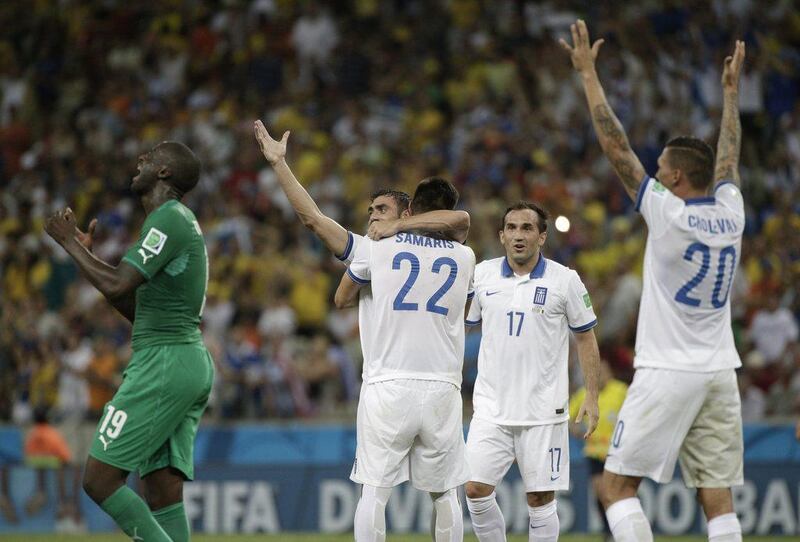FORTALEZA // They arrived, as they always do, with grandstand names and grander expectations. They left, as they always do, having failed to live up to the hype.
Ivory Coast departed the Arena Castelao last night managerless and in tears after slipping to a 2-1 defeat to Greece, the least fancied of unfancied European teams. The result, which came by way of a heartbreakingly late penalty kick, ended the hopes — and surely the international careers — of the Africans’ golden generation.
Didier Drogba, Yaya Toure, Kolo Toure, Didier Zokora, Arthur Boka, Boubacar Barry. All are over 30; all are likely to never grace a World Cup again. Yet to paint them as protagonists of their own Greek tragedy would be unfair to the Greeks.
True, last night’s crushing defeat arrived from the penalty spot in the 91st minute, but Greece struck the woodwork three times and were far better value for the win. An undeserved sucker-punch this was not.
Once again, the individual talents in the Ivory Coast squad have failed to play as a collective force. Over the course of three manageable games, they failed to raise the level of their weaker players, while also not managing to extract the maximum from their better players. They finished with three points, taken in their opening game with Japan — and only after falling behind.
Sabri Lamouchi, 42, announced immediately after the game he would not consider remaining in his role as head coach, saying that a failure to win the African Cup of Nations or progress through their group in the World Cup could not be deemed success. It was the noble thing to do. It also ensured he beat his employers to the punch for surely his reign was over the second Georgios Samaras’s penalty hit the net.
Yaya Toure appeared a shadow of the driving force that helped drag Manchester City to the Premier League title, Drogba was reduced to substitute appearances in the first two games and Kolo Toure never played a minute until Zokora picked up two yellow cards and was forced to sit out the Greek defeat. Gervinho was arguably the only player who did his reputation no harm.
Lamouchi was routinely quizzed about his tactical and personnel decisions by inquisitive Ivorian media. No matter what he said, he could not escape the omnipresent Drogba issue, yet he remained bullish, insisting there were 23 players and not just one or two stars.
With the Galatasaray forward having made an effect in his cameo appearances, however, he started against Greece, playing his usual role of part-battering ram, part-target man, part-skilful link-up player. It proved emblematic that when he was replaced in the 78th minute by 21-year-old Ismael Diomande, the veteran forward refused to shake hands with the technical team.
It would ultimately be Drogba’s last World Cup appearance and he bowed out in a bad mood before the tie was even over. Perhaps the only way this Elephants team can grow is to start afresh, without egos and expectations. In that regard, the elimination of the golden generation could be seen not as the end, but as the beginning.
gmeenaghan@thenational.ae





